- Home
- Tom Sharpe
Ancestral Vices Page 2
Ancestral Vices Read online
Page 2
In short, the cost of maintaining the Library proved catastrophic to the economy of the University. Science and Technology languished, laboratories lacked adequate equipment, and physicists, chemists and engineers migrated to more generous establishments.
Paradoxically the Humanities, and in particular the Social Sciences, flourished. Attracted by the spirit of innovation so clearly manifest in the Library, eminent scholars ignored at Oxbridge or bored by redbrick flocked to the concrete campus. They brought with them an evangelical fervour for the experimental, the radical, the anarchic and the interpersonally permissive that was, even in the middle sixties, far in advance of their students. What was demanded by revolutionary students at other universities was imposed on the undergraduates at Kloone.
Young women from respectable working-class homes found themselves marshalled into dual-sexed hostels with unisex washing facilities. Their complaints that sharing beds, bedrooms and almost inevitably parts of themselves with young men had not been mentioned in the prospectus and was hardly conducive to serious study were met by wholly unwarranted accusations of latent lesbianism, which in those days had yet to become entirely respectable.
Having imposed the ostensible aims of Women’s Liberation before anyone else, the authorities had gone on to inculcate their own classless ideals into students whose presence at the University was in itself a measure of their determination to climb the social ladder by the only means made available in the Welfare State. Lecturers fashionably extolling the virtues of the proletariat to the sons and daughters of millhands, miners and steel workers found themselves faced by a blank bewilderment and an extraordinarily high rate of neurosis. And so, while other universities became battlegrounds between A-level enragés and proto-Fascist dons, attempts to engender left-wing militancy at Kloone failed hopelessly. There were no ‘sit-ins’ – no one in his right mind would willingly sit in the Library and there was no other building large enough to accommodate the numbers required to create mass hysteria; no demands for student control; no invasion of the records office; and a positive refusal to attend staff self-criticism seminars. Even the graffiti sprayed so ineptly by lecturers were promptly scrubbed off by student volunteers and the only demands voiced were those asking for the end of continuous assessment, the re-imposition of exams and the introduction of strict discipline with rules and regulations which would free the student body from the agonies of decision.
‘If only they wouldn’t listen so attentively,’ the Reader in the Mechanics of Socio-Political Engineering had complained after spending an hour fulminating against the militaristic excesses of contemporary democracy. ‘They give one the entirely false impression of understanding the objective conditions under which they are media-manipulated, then hand in essays that might well have been dictated by Peregrine Worsthorne.’
The Professor of Positive Criminology sympathized. His efforts to persuade his students that murder, rape and particularly violent crimes against the person were forms of social protest, and as such no less estimable than burglary, bank robbery and fraud, had failed so hopelessly that he had twice been visited by the police investigating complaints from undergraduates that he was guilty of incitement.
‘I sometimes think we would get a more sympathetic hearing at a meeting of the Monday Club. At least there would be some degree of controversy. My lot simply write down everything I say and then spew it back to me with conclusions so far at variance with my own that I can only assume they think I’m being ironical.’
‘If they think at all,’ said the Reader. ‘In my opinion they’ve been so grossly indoctrinated since childhood they’re incapable of conceptual thought in the first place.’
In this atmosphere of staff disillusionment and student dedication the singular figure of Walden Yapp, Professor of Demotic Historiography, stood, or more frequently strode, for that rigorous common touch on which Kloone had hoped to pride itself. Ideologically his pedigree was beyond criticism. His grandfather, Keir Yapp, had dropped dead on the march from Jarrow and his mother, while still in her teens, had served as a part-time waitress in the International Brigade before being captured, raped and consigned to a nunnery by Franco’s troops. Her escape in the weekly nightcart, her travels as an itinerant leper through Seville to Gibraltar where she was refused entry as a health hazard, and her desperate attempt to swim to freedom only to be picked up by a Soviet troopship and transported to Leningrad, all this had lent Elizabeth Hardy Yapp a legendary respect in extreme left-wing circles. Moreover she had spent the first two years of the War denouncing the Government as capitalistic warmongers and with the entry of Russia had used the good offices of the Ministry of Information and her own histrionic gifts to exhort factory workers to defeat Hitler and to elect a Labour Government at the next General Election.
It was as a result of a particularly emotional speech in Swindon that she had met, considered marrying, and had conceived a child by someone called Ernest. Like so much else in her stormy life the attachment had been brief. Spurred into unnatural pugnacity by his mistress’s fiery rhetoric, and possibly by the thought that he might have to spend the rest of his life listening to it, Ernest had done his country no great service – he had been an extremely skilled toolmaker in a reserved occupation – by enlisting and getting himself killed at the first available opportunity.
Miss Yapp had added his death to her list of social grievances and had used the aura still surrounding the name of Yapp in Jarrow to secure a safe Labour seat in Parliament. As ‘Red Beth’ she had represented Mid-Shields with an extremism so unmitigated by practicality that she had never sullied her reputation by being offered a post in Government. Instead she had gone from strength to strength reviling the leaders of her own party for class treachery and the rank and file of all others as downright capitalists, while ensuring that Walden received the best education invective could buy and otherwise leaving him in the care of a deaf and religiously inclined aunt.
In the circumstances it was hardly surprising that Walden Yapp grew up into a singular young man. In fact it was surprising he grew up at all. Isolated from the ordinary world of children by his aunt’s fear that he might pick up nasty habits from them and fed an intellectual diet compounded of The Book of Revelation and his mother’s inflammatory rhetoric, he had by the age of ten so fused the two into a single doctrine in his own mind that he had been known to sing ‘Abide With Me’ at Labour Party Conferences and ‘The Red Flag’ in the local chapel. But his singularity did not only consist of his unquestioning confusion of religion with politics: in his own way Walden Yapp was a genius. Thanks to his aunt’s determination to keep his thoughts pure and holy she had denied him any reading matter other than the Bible and the Encyclopaedia Britannica. Walden had read both from cover to cover so many times that he was capable even at nine of stating without hesitation that a zygote was a fertilized egg or ovum. In short his knowledge was quite literally encyclopaedic and, if organized solely along alphabetical lines, too prodigious for the comfort of his teachers. It also helped to put him in quarantine from other children who didn’t want to know where the letter A originated or even that an abacus was an early form of computing device. Walden went his own way. When he tired of remembering what anything was he turned to the only other reading matter in the house, a series of railway timetables which had once belonged to his grandfather.
It was here that his genius first showed itself. While other boys experienced the disorientation of puberty, Walden was discovering how best to get from Euston to King’s Cross by way of Peterborough, Crewe, Glasgow and Aberdeen, the best way in his view being that which was the most complicated. The fact that half the stations no longer existed and that lines had been axed was of no importance. It was enough to know that in 1908 he could have travelled the length and breadth of Britain without once having to enquire the time or destination of the next train at any booking office. Better still to lie in bed at night and visualize the effect of altering the points at three strategic juncti
ons at exactly the same moment. According to his calculations it would have been possible to bring the entire network of the LMS, the LNER and the Great Western Railway to a catastrophic halt. It was here, in these extraordinary compounds of useless knowledge with valueless mathematical and spatial computations, that Walden Yapp’s brilliant future was born. Of reality he knew nothing.
On the other hand his prodigious grasp of theory so baffled his teachers and examiners that, without knowing the limitations of his intellect, they had to pass him as rapidly as possible on through school to university and from First-Class Honours degrees to his Doctorate. In fact his doctoral thesis on ‘The Incidence of Cervical Carcinoma in Female Mineworkers in 1840’, the statistics for which he had gathered from the records of hospitals and workhouses in the Newcastle area, had been so startling and in detail so repulsive that it had been accepted on first reading – and in the case of one examiner with only a cursory glance at the first few pages.
It was on the strength of his reputation for unthinking radicalism, and indeed for unthinking thought, that he was offered the fellowship at Kloone. From that unwarranted moment Walden Yapp had never looked back or, to be more precise, had never ceased looking back while moving steadily forward. His second monograph, ‘Syphilis: An Instrument of Class Warfare in the 19th Century’, had sustained his reputation, and his lectures proved so popular – he interspersed undiluted bias with irrefutable statistics to such an extent that his students were as untrammelled by the need to think or by intellectual uncertainty as if they had been required to learn a telephone directory off by heart – that his election to the Professorship of Demotic Historiography had been merely a matter of time and unremitting publication.
And so by the age of thirty he had established himself as the most harrowing chronicler of the horrors endured by the English Working Person in the post-Industrial Revolution since G. D. H. Cole and even Thompson. More importantly, in his own eyes at any rate, he had made demographic history almost an art form by a series of TV plays on the domestic agonies of Victorian Britain aptly named The Proof Of The Pudding, which, if they had done little to enhance his reputation in the stuffier circles of academe and had caused more than one viewer to vomit, had helped to make the name of Walden Yapp and keep that of Kloone University before the disgusted public.
Nor was that all. In the field of industrial relations he had left his mark. Governments, anxious to appear impartial in the war to the national death waged between management and unions, could always rely upon Walden Yapp to act as arbitrator in unduly prolonged strikes. Yapp’s peace formula, while unpalatable among monetarists, invariably found favour with unions.
It was based on the simple assumption that demand must predicate supply and that what applied in the field of economics per se must have equal validity in wage negotiations. His application of this formula through hours, days and sleepless nights of intense discussion had resulted in the need to nationalize several previously profitable companies and the suspicion held in extreme right-wing circles that Walden Yapp was an agent of the Kremlin.
Nothing could have been further from the truth. Walden Yapp’s dedication to democracy was as genuine as his belief that the poor need not always be with us but that, while they were, they must of necessity be in the right. It was a simple view, though never so simply expressed, and it saved him the trouble of having to make decisions of more than a personal nature.
But it was here that his life lacked fulfilment. He had no personal life to speak of and what there was could hardly be called natural. From a lonely childhood he had progressed to a lonely adulthood, both abstract to the point where it was impossible to say he had ever been a child or had become an adult. He remained singular in every sense of that word and if students flocked to his simple lectures, his colleagues flocked out of the common-room the moment he entered rather than suffer the boredom of the wholly inconsequential monologues he mistook for conversation. In short, Walden Yapp’s personal life consisted of tutorials with his students, assisting PhD graduates with their theses, discussing his TV plays with bemused producers, and last but by no means least in playing chess with the computer Lord Petrefact had bequeathed to the University. If he had been asked to name his best friend he would truthfully have had to say the computer. Strictly speaking it was his only friend. And best of all, it was available day or night. Situated in the basement of the Library, it could never get away from him. He could either go down and sit at a keyboard there or, more conveniently, switch on the terminal beside his bed, type out his password and immediately get through to what amounted to his electronic alter ego. Even when he left the campus he could still take his modem with him and, by simply installing the telephone receiver in its slot, resume his discussions with the computer. Since he programmed the computer according to his own ideas it had the inestimable merit, not to be found in human friends, of seldom disagreeing with him and then only on matters of fact but never of opinion. Into it he poured all his statistics, all his findings and theories, and from it he obtained his only companionship. About the only thing he couldn’t do was sleep with it, not because he objected to its physical appearance, which he found entirely acceptable, but from fear of electrocution and the thought that his physical intrusion would almost certainly put an end to their beautiful if Platonic relationship.
That it was a genuine friendship Yapp had no doubt. The computer told him things about his colleagues’ work and he could scan through their correspondence and their latest findings by the simple expedient of using their codewords. That these were supposedly secret was no deterrent. The hours and nights he had spent in the computer’s company had given him an uncanny insight into the creature’s peculiar dialect and mode of thought. It was as though it too, or she as Yapp preferred, had spent her formative years ingesting railway timetables and reconstituting them along lines similar to his own. Yes, there was no doubt in his mind that she was his friend and with her help he would arrive at that total knowledge of all things which his singular upbringing had taught him was the purpose of living.
In the meantime there was the bothersome business of reality to attend to.
3
Reality first intimated its intrusion into his life in the shape of an envelope with a crest of a griffon on the back. At least Walden supposed it to be a griffon, although it looked alarmingly like a vulture to him. Since he found it in his pigeon-hole at the Faculty of History it was only natural that his singular gift of association should lead him to suppose for a moment that it had perched there by mistake. But no, it was addressed to Professor Yapp and inside was a letter typed on similarly crested note-paper stating that Lord Petrefact would be staying at Fawcett House over the coming weekend and would much appreciate the company of Professor Yapp to discuss the possibility of ‘your writing a history of the Petrefact family and in particular the part played by the family in the industrial sphere’.
Yapp stared at the last sentence in disbelief. He knew exactly what part the Petrefact family had played in the industrial sphere. A remarkably foul one. A whole list of sweatshops, mines, lead-works, mills, foundries, shipyards and appalling factories jostled for pre-eminent vileness in his mind. Wherever labour was cheapest, conditions of work worst and profits highest, the Petrefact family had been there. And he was being invited to write the family history? Considering that he had mentioned their role as exploiters of the working class in at least two of his TV plays it seemed a most unlikely invitation. About as likely in his opinion as the Rockefellers inviting Angela Davis to write a piece on their role in the sphere of race relations. In fact, even more unlikely. It was absurd and, with the thought that there must be some hoaxer who could lay his hands on Petrefact crested paper, Walden Yapp strode into the lecture room and gave a more than usually grisly account of the Match Workers’ Strike.
But when he returned to his office the letter was still there on his desk and the griffon looked more vulturine than ever. For a moment Walden Yapp considered di
scussing the question with the computer before remembering that Lord Petrefact had given it to the University and that its judgement might be tainted by this association. No, he would have to decide himself. And so picking up the phone he dialled the number of Fawcett House. The reply he got from a man who claimed that he was the frozen food auditor of a firm of contract caterers and he wouldn’t know Lord Petrefact from a cod fillet if he saw him did little to put his mind at rest. His second call was answered by a voice so tinged with revulsion that it suggested that its owner was holding the receiver with a pair of surgical forceps and talking through an antiseptic mask. Yes, the voice conceded, Lord Petrefact was in residence but on no account to be disturbed.
‘I merely want to confirm that he has invited me,’ said Yapp. The voice agreed that this was indeed the case but it implied that as far as it was concerned the presence of Professor Yapp at Fawcett House was about as welcome as a dose of Lassa fever.
Yapp put down the phone, finally convinced that the letter was genuine. Incivility of the order of that arrogant voice wasn’t typical of a practical joker. If Lord Petrefact thought he could get away with treating Walden Yapp like some forelock-tugging millhand he was in for another think. And if he imagined for one moment that the family history as written by Walden Yapp was going to be a paean of praise and a literary puff for a family that had made a fortune out of the miseries of ordinary decent working folk, he would learn what class solidarity really meant. To make quite sure that Lord Petrefact was under no illusions he turned to the keyboard of his automatic typewriter and composed a letter accepting the invitation but making it as abundantly and arrogantly plain as the voice he had spoken to that he disliked the idea of being a guest in the house of a capitalist bloodsucker.

 Blott on the Landscape
Blott on the Landscape Porterhouse Blue
Porterhouse Blue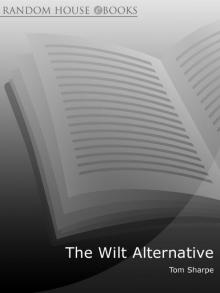 The Wilt Alternative:
The Wilt Alternative: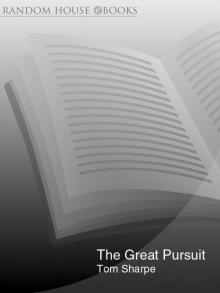 The Great Pursuit
The Great Pursuit Ancestral Vices
Ancestral Vices The Midden
The Midden Vintage Stuff
Vintage Stuff The Throwback
The Throwback Grantchester Grind:
Grantchester Grind: Wilt on High:
Wilt on High: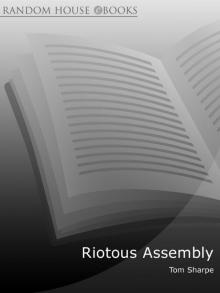 Riotous Assembly
Riotous Assembly Indecent Exposure
Indecent Exposure The Gropes
The Gropes Wilt in Nowhere:
Wilt in Nowhere: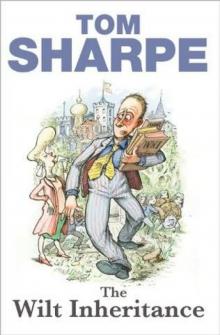 The Wilt Inheritance
The Wilt Inheritance Wilt:
Wilt: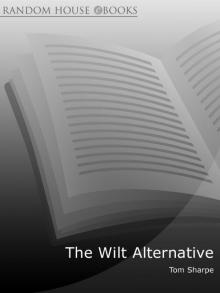 The Wilt Alternative
The Wilt Alternative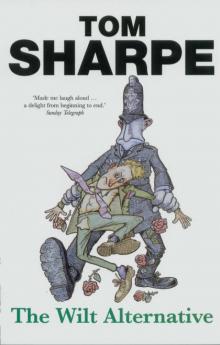 The Wilt Alternative w-2
The Wilt Alternative w-2 Grantchester Grind
Grantchester Grind Wilt on High
Wilt on High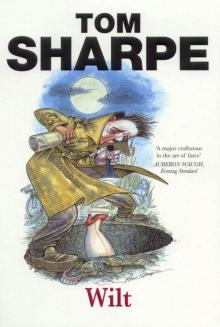 Wilt w-1
Wilt w-1 Wilt
Wilt The Wilt Inheritance (2010)
The Wilt Inheritance (2010) Wilt in Nowhere
Wilt in Nowhere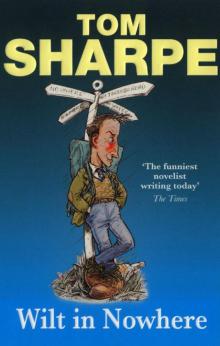 Wilt in Nowhere w-5
Wilt in Nowhere w-5 Wilt on High w-3
Wilt on High w-3